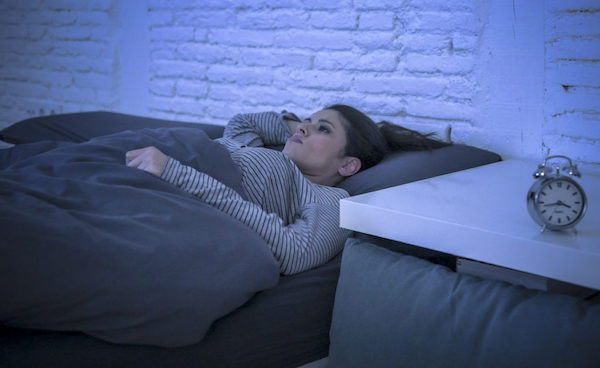In an ideal world, you’d simply drop off into a peaceful slumber every night. But ask any woman over 40 if that’s the case and she’ll probably tell you it isn’t, and that she wouldn’t mind sleeping better. She’s probably also tell you she wishes she knew how to sleep better with anxiety.
Sleep—or a lack of good sleep—can often cause you to feel bad emotionally and physically. In fact, research shows that sleep is a complex state that affects a wide range of your body’s mechanisms, including:
• brain plasticity
• memory
• emotional processing
• cardiovascular function
• respiratory function
• cellular function
• immune function
A large study also shows the specific interconnectivity of insomnia and depression. It’s clear that sleep affects your overall wellness. [1]
About Insomnia
Today, with more than 40 million Americans struggling with insomnia, sleep disorders are at epidemic proportions. And they not only effect adults (they are especially common in women); up to 25% of children also suffer from sleep disorders! [2, 3]
Those who suffer from insomnia—which is defined as a having difficulty sleeping for more than 4 weeks—are commonly hyper-aroused and have an increased metabolic rate across the 24-hour circadian cycle. This may explain why they are less sleepy during the day by objective measures than “normal” sleepers. But what are some of the causes of insomnia?
Common Medical Conditions
Gastroesophageal reflux disease
Restless leg syndrome
Chronic pain
Sleep apnea and snoring
Other Common Contributors
Caffeine
Alcohol
Prescription and over-the-counter drugs
Quality Sleep: 10 Tips
To combat insomnia, here are some specific areas of sleep hygiene you may want to focus on:
1. Follow the rhythm of life.
Establish a regular bed and rising time, get exposure to early morning sunlight and dim evening light, and maintain regular times for meals and exercise. (Although napping has health benefits, it can worsen the effects of insomnia.)
2. Manage intake of caffeine, nicotine, alcohol, and other drugs.
These are all sleep disruptors. Recommendations about caffeine may not be conservative enough given its significant half-life.
3. Avoid exercise before bed.
Regular cardiovascular exercise promotes healthy sleep, but not 3 to 4 hours prior to bed (it raises your core body temperature, and can interfere with sleep).
4. Avoid high glycemic and hard-to-digest foods in the evening.
Instead, opt for complex carbs; they may help transport tryptophan, a precursor to melatonin.
5. Create a healthy sleep environment.
Keep your bedroom cool (about 68ºF), completely dark, quiet, and as “green” possible. If possible, use HEPA filtration to clean the air and choose organic and non-toxic bedding and mattress.
6. Limit screen time before bed.
Blue light from your computer and phone screens can cause melatonin suppression and disrupt sleep. [4] Smartphones offer a blue light filter that can be enabled by the user and glass lenses now offer blue-light filtering.
7. Move your clock.
Clock watching merely stimulates wakefulness. Ideally, position the clock away from the bed.
8. Use mind-body techniques to manage hyperarousal.
Cognitive behavioral therapy (CBT) addresses sleep-related dysfunctional thoughts that trigger arousal. An excellent resource is a free app called “CBT-i Coach” that provides various relaxation techniques. For best results, couple that with modalities such as mindfulness meditation, muscular relaxation, self-hypnosis, breathing exercises, and guided imagery.
9. Using your bed only for sleep and sex.
Minimize wakeful time spent there by going to bed only when sleepy. If more than 15-20 minutes of nighttime wakefulness occurs, get out of bed, do a non-stimulating activity, and then return to bed once you feel sleepy.
10. Consider supplementation.
When discontinuing hypnotics or otherwise indicated, short- term supplementation with herbs like valerian, passionflower, lemon balm, lavender, chamomile, and/or hops can be helpful. Melatonin is useful in older populations or if you have circadian irregularities. Always couple this with other sleep hygiene recommendations.
Quantity of Sleep: How Much Is Enough?
According to Dr. Param Dedhia, MD, Director of Sleep Medicine at Canyon Ranch, it is a fallacy that we need less sleep as we get older. Most all adults need 7 to 9 hours of sleep a night. But it evolves throughout adulthood, with older people getting less deep sleep. They are also more arousable at night; however, they are able to better cope with arousals.[5]
Some of the consequences of poor sleep include decreased tolerance for pain and hunger, explains Dr. Dedhia.[6, 7] The following sleep and/or stress chemicals do double duty as hunger chemicals:
Cortisol | Signals stress
Hypocretin / Orexin | Difficulty staying awake
Neuropeptide Y | Carbohydrate craving
Gallanin | Fat craving
Ghrelin | Immediate hunger signal
To avoid cravings during the day, it’s best to do all you can to clock your 7 to 9 hours of sleep each night. But ultimately, it’s impossible to force sleep. We can set the stage and be receptive to it, but we cannot intentionally “go to sleep.” Letting go and succumbing to slumber may be the most important thing we can do to get that perfect night’s sleep.

Karen Malkin is among the first National Board Certified Health & Wellness Coaches in our country. Karen is the founder of MCT Lean, a plant based, dietary supplement company. She serves on the Philanthropic Council for the Osher Center for Integrative Medicine at Northwestern Medicine and as a board of director for the Environmental Working Group. Some of Karen’s specialty areas include her 14 Day Transformation series, emotional eating, weight loss, the science of nutrition, high energy superfoods, smoothies, supplementation, managing cravings, and healthy lifestyle makeovers. Learn more: www.karenmalkin.com This article was originally published here.
Resources:
[1] https://www.ncbi.nlm.nih.gov/pubmed/22879427
[2] https://www.ncbi.nlm.nih.gov/pubmed/22113512
[3] https://www.ncbi.nlm.nih.gov/pmc/articles/PMC3218792/
[4] https://www.ncbi.nlm.nih.gov/pubmed/25193149
[5] Watson NJ, et al. Recommended amount of sleep for a healthy adult: A joint consensus statement of the American Academy of Sleep Medicine and Sleep Research Society. Journal of Clinical Sleep Medicine. 2015;11:591.
[6] https://www.ncbi.nlm.nih.gov/pmc/articles/PMC3632337/
[7] https://www.ncbi.nlm.nih.gov/pubmed/25915149




















